Articles
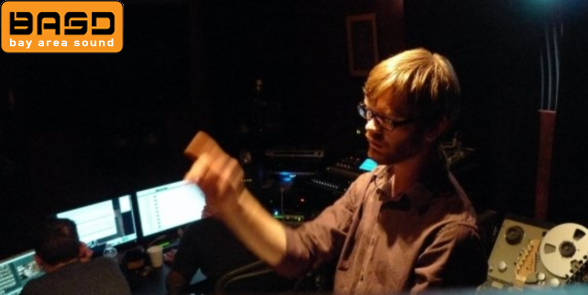
Bay Area Sound Interview Schafer and Telltale and insects, oh my!
Bay Area Sound was formed around the same time that Double Fine Productions was, and you handled the sound design for Psychonauts and most recently, I believe, Brutal Legend. How did the collaboration with Double Fine come about, and what was it like working on those games?
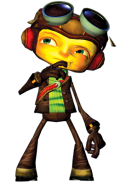
First of all, doing game sound for a Tim Schafer project is like making chocolate with Willy Wonka. Tim and Clint had a huge history at Lucasarts and we became the natural first choice when Psychonauts went into production. Once again it was Clint and I in a collaboration with Peter McConnell, just like old times. Of course, due to the business/publishing side of things, we ended up working on Psychonauts for about 5 years! During the course of that 5-year project, Clint took a job at Sony (where he is today) and I continued the project with Jared Emerson-Johnson (who we had hired to help out on the Indiana Jones and the Emperor's Tomb score). It's still one of the best games ever made and perhaps the only one I still dust off from time-to-time. Would you believe I scored all of those cinematic sequences in 10 days! As for Brutal Legend, we got on board early and worked on the prototype. Once it got the green light, Tim decided he needed someone in-house to achieve what he wanted. It was a sad day for us because we loved working with those folks, but we were not in a position to go in-house. They did a great job though and if you have not played it yet, it's time to. Of course I am still holding out hope to work on a Double Fine project again… so Tim, if you are reading this, WTF?!
Bay Area Sound worked on Insecticide, a story-driven bug detective game by Crackpot Entertainment, another label founded by LucasArts vets. Unfortunately, the game’s PC version was canceled after the first of an intended two-part release, although the heavily scaled down Nintendo DS release is a complete version of the game. What can you tell us about the sound design of that game, which like Psychonauts strove for a balance between graphic adventure elements and action gameplay?
Sadly this game did not get the credit it deserved because Mike Levine and Larry Ahern had really created something cool. In retrospect, it probably should have come out on the PC/Mac and consoles. The DS is a great platform, but the artwork and story this game had---the great voice acting, music and sound needed air to breathe. Regardless, we packed more audio into that little cartridge than I think is possible and it was a great experience.
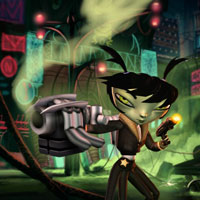
Another studio of ex-LECers is Autumn Moon Entertainment, which thus far has put out the graphic adventures A Vampyre Story and Ghost Pirates of Vooju Island, for which Bay Area Sound has done both the sound design and the voice direction. In what ways did you endeavor to contribute to the heavy atmosphere the studio’s games have been characterized by thus far? What’s it like to work on such consciously old-school graphic adventures again?
Vampyre Story was a blast to work on and it was great to be working with Bill Tiller again (who I had not seen since Monkey 3). When you look at the artwork for that game it's almost impossible not to be drawn into each location. Creating the sonic ambiences was one of my favorite parts of that game… to be able to sit there starring at screenshots of those locations and give them sound was a true pleasure. We're ready, willing and waiting to work on the sequel!
We didn't work on Ghost Pirates (but we should have).
Bay Area is also closely associated with the ex-LucasArts graphic adventure studio Telltale Games, for which I believe the company has done the sound design and voice direction for nearly every title. Jared, you are also the composer of the superb soundtracks for the Sam & Max and Bone series. What sort of working relationship do you guys have with this team of LucasArts adventure alumni? Jared, can you drop any hints about what new territory, musically, that we can look forward to entering with Sam & Max Season 3?
Jared here…. yes—we're in daily contact with all of the talented folks at Telltale! Not a day goes by where we don't do some bit of work on a Telltale project, so yes, it's a very close working relationship.
Without giving away too many details about the score, I can assure you that the season 3 music is going to be an eclectic mix with a jazzy undercurrent, much like the earlier seasons. I can say that there will be more new straight-up jazzy material in the style that was such a big part of the first half of season one—along the lines of the tracks that appeared in the office, the tv studio, the street, etc. There will also be a good amount of more old timey jazz, classic noir, and the biggest new musical flavor: cheesy 70s sci-fi. I'm really excited about how the score is shaping up thus far, and I think folks are really going to like it when they hear the games!
For some Telltale series, like Strong Bad, CSI, and Wallace & Gromit, the soundtracks are pieced together from various bits of previously existing music. How is this method of “arranging” compositions easier and more difficult than being able to conceive the music from scratch, especially with regard to generating a feel of coherency and a sense of appropriateness with the action on the screen?
Jared here again… generally speaking, the process of putting together an edited score from existing material is a bit simpler than composing from scratch, although it does have it's share of unique challenges.
The biggest difference is in where the process begins. With an original score there is a lot more freedom to determine precisely how we want the tone of the music to fit into the scene. With an edited score, it's about listening through all of the source material many times, and organizing it into subgroups based on the instrumentation, tone and tempo of the source cues, then making edits that best fit the scenes in question. Writing original music begins from an essentially creative core, whereas editing source is much more about crafting together something. It's a very right-brain/left-brain sort of contrast.
Now, the type and amount of the source material makes a big difference, too. On CSI, for example, we had many hours of source music to work with; so, the process of editing music for that franchise is a bit more on the creative side, since there are generally several cues that could work well for a scene, and it's up to us to craft the ones that best create that atmosphere we're looking for. With Strongbad, on the other hand, there was much less source to work with, so the tracks had to be very carefully selected to make sure everything was covered by something appropriate (which often meant pulling a cue from one environment to another, and then having to shuffle everything else around to make it all fit...more like a "matching" puzzle).
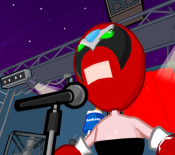
Believe it or not, Wallace actually had a 99.9% original score. I did make and record a transcription of the main theme for the credit sequences, but everything else in that score was all newly composed and produced for the games. It's great to hear that it came across as though it was music from the films, that's the best compliment we can get for that type of score!
Much has been said about how friendly the “Telltale Tool” is from a production standpoint. To what degree of control do you guys have when implementing the sound of a Telltale game with regard to things like timing? Could you give us any kind of perspective of what the process is like from your end?
I'm going to let Damian Kastbauer (our implementation guru) answer this one. But suffice it to say that the Telltale Tool is a living, breathing application that is constantly getting tweaked and honed to better serve it's purpose. OK, take it away Damian…
The Telltale Tool is all about timing. For each animation or set of animations we are able to dynamically scrub through and insert sound files visually to complement the action of a scene. We can then zoom in and fine tune when those sounds get played back to insure that it all syncs up. We take a very granular approach to the sound files by breaking down complex interactions into multiple tiny files. For instance, the sound of Guybrush preparing to sword fight might consist of: the sound of his hand grabbing the sword, unsheathing the sword, and possibly whipping in into position. Creating these as separate files with multiple variations of each allows us to use them across common actions and quickly add them to any scene or animation that may have different timing. We also have the ability to adjust volume of a sound over time visually to fade in and out a sound, as well as how it is mixed in relation to the music and voice. Once animations and scenes are completed, we'll make a pass at adding sound to help accentuate the visual action or help to reinforce any story or gameplay based sound needs. The process continues throughout production with multiple play-through's to uncover any missing sounds and continue adding detail to the mix.
As Telltale is an episodic developer, how do your schedules for their series’ differ from those of more “traditional” games, for example, in terms of recording the voice work?
The actual work load is similar if you add up all the episodes. Where it differs is the pace at which it needs to be recorded. We typically record the first episode in about 2 weeks, then wait a period of time to see what pickups are needed. Then we'll hit the studio again with the 2nd episode and any pickups from the 1st…. it's actually pretty efficient. For sound and music it can get tricky but we have become pros at avoiding the potholes that used to catch us in the beginning. We have been on board with Telltale since Bone and have become pretty wrapped into their production process, I think it's the part of the reason we are able to pull so much off in so little time.
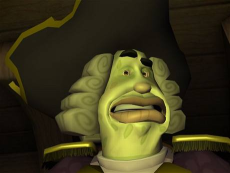
The voice acting in the games of all the aforementioned companies has a tendency to be top-notch, and fans of all those companies’ games are likely to hear a lot of familiar voices. For games on which BA Sound does the voice work, how do you find the right talent, local or otherwise, and what’s it like working with them?
First of all, thank you for the kind words! We have a history with a lot of these actors and we know their strengths and their limitations. While we continue to add new people to the roster though the various talent agencies we employ, it's always nice to be working with someone who is both familiar and professional. The bottom line with voice directing is that you need good writing and you need good acting. 99% of my job is making sure the line read sounds real. When it doesn't, it's obvious. We have been fortunate in that most of the titles we work on have good writing.
Although the games you have and continue to work on run the gamut of genres and tones, it's notable that your names are attached to quite a few LucasArts adventures games, as well as the games of many story-driven studios listed above that were founded by fellow former employees (Double Fine, Telltale, Autumn Moon, Crackpot) of LucasArts. What continues to make story games attractive, or even preferable projects to contribute your talents to? How does sound design for such games differ from that of other types? How does the fact that story games seem to be as alive and well as ever sit with you as gamers rather than game developers?
I love adventure games, especially ones with good stories. Why we have been so fortunate to work on so many good adventure games I don't know but I sure am not ready to stop. Adventure games are more like little interactive films to me… all the sonic elements need to work together to allow the player to forget they are playing a game. Don't get me wrong, I love working on action titles too, but there is something intimate about an adventure game. The fact that adventure games seem to be making a strong comeback is wonderful news to us because I think it appeals to an audience that has been somewhat overlooked by game developers. In the beginning, you needed to know your way around a computer to play a game. Now gaming is accessible to literally everyone on a variety of platforms. When it comes to adventure games, perhaps Guybrush's little bumper car boat has merely seen the tip of the iceberg? Let's hope so.
Special thanks to Julian Kwasneski, Jared Emerson-Johnson, and Damian Kastbauer for answering our questions, and of course to the entire crew at BA Sound and studio.jory.org for their past, present, and continued work on the games we hold dear. Thanks for giving us a reason to keep our speakers always on, guys!
For more on BA Sound, check out their official web site and Facebook page, where you can find all kinds of great photos in the studio from voice/music recording sessions. I might also remind you that Jared's excellent soundtracks for Sam & Max are available, respectively, in 2-disc album releases, and that all of his equally astounding work on Bone is available absolutely free.
Interview conducted by Jason, for which we sincerely apologize.